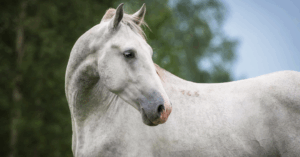
Gastro Pellet: Stomach Well-being Starts in the Mind
Anyone who spends every day around horses knows it well:…
Feed and products in 25kg bags excluded
Bank transfer | Paypal | Credit cards
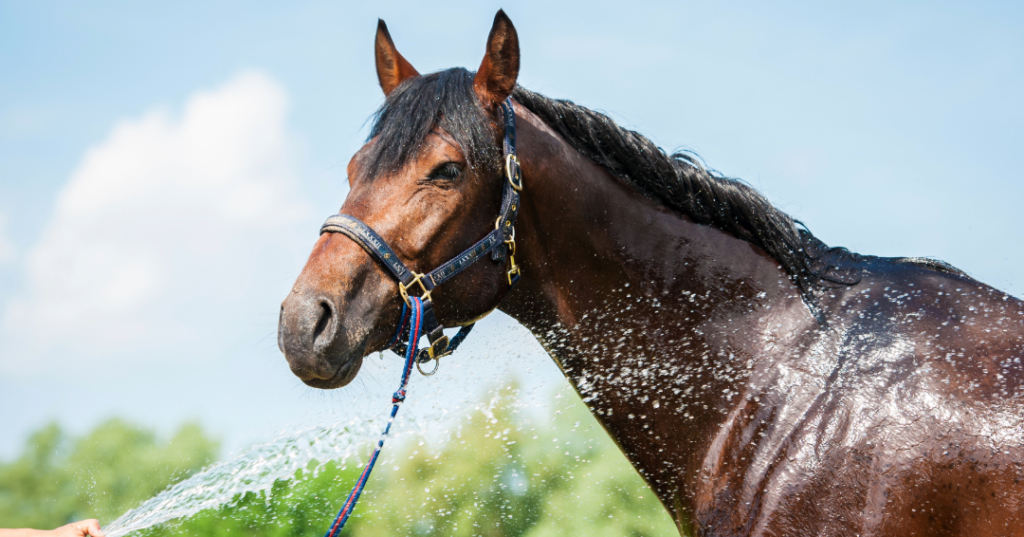
With the arrival of warmer weather, the competition calendar gets busier, and it’s not uncommon to find yourself competing during the hottest parts of the day. This can put significant strain on the horse, affecting both its performance and recovery. After intense exertion, a horse is in a particularly vulnerable state: its core temperature is elevated, its cardiovascular system is under stress, and it has lost a substantial amount of fluids and electrolytes. Proper management of this phase is crucial to prevent prolonged overheating, reduce the risk of heat stroke, and promote a fast, effective recovery.
Why cool down a horse after exercise?
During a competition, a horse’s core temperature can easily exceed 40°C due to accelerated metabolism and intense muscular effort. If this temperature isn’t quickly brought back within the normal range (37.5–38.5°C), the risk of cellular damage, severe dehydration, and circulatory issues increases significantly.
Moreover, heavy sweating leads to the loss of water and essential electrolytes, which must be replenished to prevent imbalances, muscle cramps, and fatigue.
6 effective post-competition cooling strategies
1. Fresh water, never ice-cold:
The first step is rinsing the horse with cool water (15–20°C) on strategic areas such as the neck, chest, legs (especially hocks and fetlocks), and inner thighs. These regions have a high concentration of superficial blood vessels, which play a key role in dissipating heat.
2. Repeated rinsing and scraping
A single rinse isn’t enough: ideally, this should be repeated at least twice, making sure to scrape the horse after each rinse. Once water makes contact with the body, it quickly warms up, and if not removed, it can form an insulating layer that slows the cooling process.
3. Ventilation
After rinsing, proper airflow is essential. Portable fans placed in the stall or aisle—or natural airflow, when possible—help evaporate both sweat and water from the skin, enhancing the cooling effect. Without moving air, the process is much slower and less effective.
4. Hydration and electrolyte supplementation
Alongside external cooling, the horse should be given unlimited access to fresh water and electrolyte supplements to restore the sodium, potassium, calcium, and magnesium lost through sweating. This helps maintain fluid and electrolyte balance, preventing muscle fatigue and weakness.
For this reason, products like Elyte C+E are essential in the daily diet of sport horses. Additionally, before and after a competition, to support recovery, prepare a bucket with 5–10 liters of water and a couple of scoops of Pro Drink. The maltodextrins and amino acids provide extra energy, while the electrolytes, milk powder, and carob help keep the horse hydrated and encourage it to drink more. Inulin and psyllium also support gut health, ensuring normal intestinal function even after intense sweating and fluid loss.
5. Avoid unnecessary stress and exertion:
During post-competition cooling, the horse should remain calm and relaxed, avoiding activities that raise heart rate, increase muscle activity, or cause emotional stress, all of which generate additional heat. To help the horse unwind while providing extra salts, Unika Balls Elyte can be offered as a simple, effective solution.
6. Monitor temperature:
If your horse seems unwell after exercising in the heat and you’re unsure whether it’s cooling effectively, check its rectal temperature every 10–15 minutes. If the temperature doesn’t drop, or worse, continues to rise, contact a veterinarian immediately.

Anyone who spends every day around horses knows it well:…
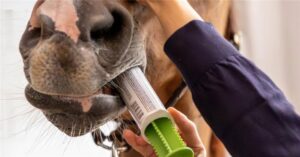
Intestinal parasites are a common and often underestimated problem in…
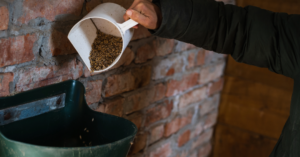
As September approaches, the quality and nutritional composition of pastures…
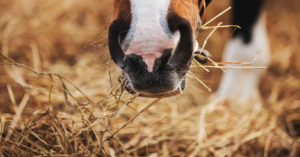
As September approaches, the quality and nutritional composition of pastures…
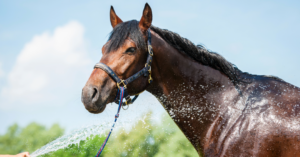
With the arrival of warmer weather, the competition calendar gets…

The importance Assessing your horse’s physical condition and determining whether…